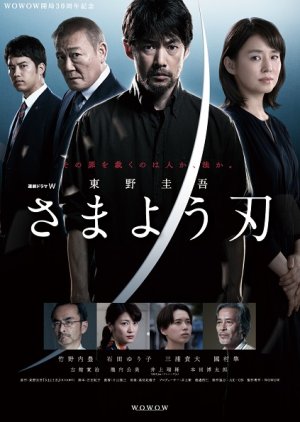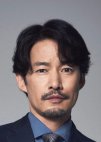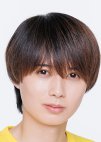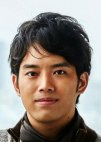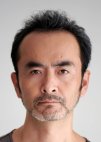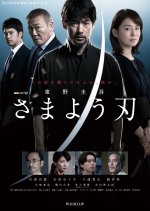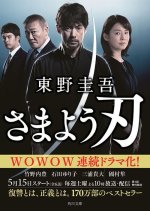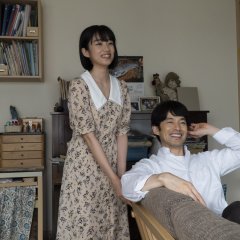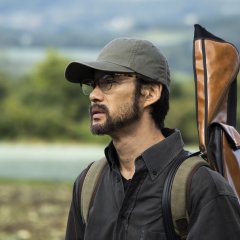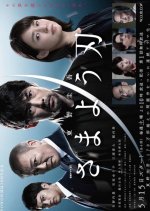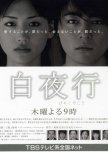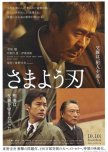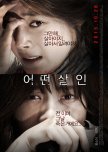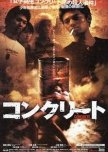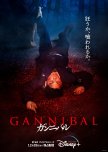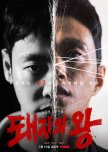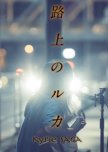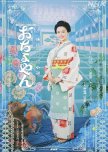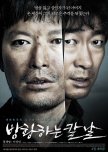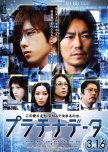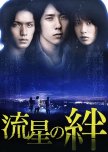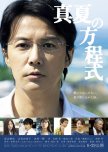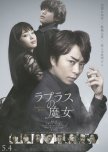~~ Adapted from a novel Modifier la traduction
- Français
- English
- magyar / magyar nyelv
- עברית / עִבְרִית
- Titre original: 東野圭吾 さまよう刃
- Aussi connu sous le nom de:
- Réalisateur: Katayama Shinzo
- Scénariste: Yoshida Noriko
- Genres: Mystère, Drame
Où regarder Keigo Higashino Samayou Yaiba
Subscription (sub)
Distribution et équipes
- Takenouchi YutakaNagamine ShigekiRôle principal
- Ishida YurikoKijima WakakoRôle principal
- Inoue MizukiNakai MakotoRôle Secondaire
- Kunimura JunKutsuka KozoRôle Secondaire
- Miura TakahiroOribe TakashiRôle Secondaire
- Furutachi KanjiMano KanjiRôle Secondaire
Critiques

WHO ARE WE TO JUDGE?
This drama prompted me to do something I never do: write a review, cause it had such a profound impact that it raised a debate in me in view of my profession.Samayou Yaiba also called The Hovering Blade is The Japanese drama I was looking for for so long. A captivating series of six episodes that prompts us to think about the impact of social justice or revenge around us, how the police deal with their own procedures, the juvenile delinquency and its consequences, the impact of the press and its management of information, but above all, how far should we allow our pain and compassion to dictate our thinking?
This drama definitely deserves to be known, I really like the way it was filmed with the absence of BGM in almost every scene. It reveals a silence full of doubts and questioning of each protagonist. With that ultimate question, what if it were you in my place, what would you have done?
I admit it’s not always easy to watch because of the violence of some scenes but it’s so well written and it reconciled me with the Japanese drama, they always knew how to treat difficult subjects in a clinical way without real criticism, just by exposing facts.
Cet avis était-il utile?

My Liberation Notes
2 personnes ont trouvé cette critique utile
Cette critique peut contenir des spoilers
Raw and Heart wrenching as it Should Be
To give an introduction to this, astutely eye-opening six episode drama, Higashino Keigo Samayou Yaiba is adapted from the 2009 Japanese movie, The Hovering Blade (Samayou Yaiba), about a father played by Terao Akira, who, after finding out the identities of his only daughter's murderers, avenges her horrific death, and the police who try to stop him. The 2021 drama version, Takenouchi Yutaka, plays Nagamine Shigeki, an architect who raises his daughter Nagamine Ema (Kawai Yuumi) on his own after his wife's passing. Ema is now a high school student with a part-time job. One day, she is called out to work the late night shift and does not return. The next day, she is found dead.Samayou Yaiba's opening scene of a father and daughter sweetly teasing each other belies the harrowing scenes of three teenage boys parked in front of a metro station, sizing up females as they walked down the street akin to ambush predators laying in wait to trap and capture the perfect prey. One got the feeling that they had definitely done this before, and unfortunately for Nagamine Ema, who was at the wrong place at the right time, to the sudden and overwhelming pouncing attack by Kaiji and Atsuya, while a third boy Mokota (Inoue Mizuki) stood powerlessly watching, paralyzed by his fear of the scene that unfolded in front of him, feeling weak, vulnerable and defeated, while helping subdue Ema. Not to excuse his behavior, but from the little I glimpsed of him, I got the sense that he was being bullied by Atsuya and Kaiji, forced to do all kinds of things he didn't want to, but doing them nonetheless, to survive himself, which he was being bullied.
Words cannot describe how dreadful it was watching the vivid cruelty of humanity as Astuya and Kaiji drugged and carelessly, loudly and brutally rapped Ema, filming their horrific actions to death and discarding her like garbage while her father does everything a parent is supposed to do, helplessly searching, passing out fliers, and even reporting his daughter missing the police to help find her. All the while not knowing the evil, ill fate that had befallen his daughter. My heart ripped for him and the sorrow that awaited him, and especially that moment he had to identify her at the morgue. Shigeki's despair at his daughter's loss was so palatable, and what an amazing job Ichikawa Riku does to have me as the audience feel his loss.
Violent acts are always choices that individuals make. Yet, it is the people who are harmed by violent acts that often receive negative responses from the police, as well as from various social institutions. I know it is the police's job to suspect everyone, even the victim and family members, and Samayou Yaiba does a great job of showcasing the prevalent issue of victim blaming. Even Mokota is prey of it to some extent by his unrelenting abusers. But worse than all that was how the law in Japan viewed juvenile delinquents who committed serious crimes versus how they viewed the victims and their families. Prior to November 2000, the Japanese Juvenile Law affirmed that juveniles under twenty will not have their cases transferred to the Public Prosecutor to impose criminal disposition. Even those who possess criminal capacity must be treated with protective measures in principle, and punished criminally only in some exceptional cases.
Even though the revised Juvenile Law, passed in November 2000, partially modified the system. The revision included three points: partially expanding the range of possible punishments of juveniles; adjusting the fact-finding process in Family Court; and protecting the victims of juvenile crimes. So it is with this in mind that I understood the police's apprehension of discussing the crime, or even eluding to the fact that a minor or minors may have committed the crime without clear cut evidence. But I also empathized with Shigeki completely, for rightfully thinking only those who've experienced loss, the way he did, could fully understand him. The scenes where he explodes at the police station, and later when he discovered his daughters' last moments, had me in goosebumps. Everything Shigeki does after that moment, the rage he unleashes, didn't only seem justifiable, but righteous. What parent confronted with what Shigeki was wouldn't take the same course of action he did, I would imagine none.
A lot unfolds in the first episode of this drama, alone, but the real story doesn't begin until Mokota, riddled with guilt, disguises his voice, calls Shigeki, and names Atsuya and Kaiji as the killers, gives him the address to the apartment where the murder took place, and tells him where to find the key. There, Shigeki discovers his daughter's clothing and pictures, as well as the video detailing Ema's brutal rape and her final moments as she lay dying while Atsuya and Kaiji laughed their heads off. And at that moment, Atsuya returns home to Shigeki's attacks. Unable to contain his anger, he mercilessly stabs Atsuya, who doesn't show any remorse, but only after he tells him where to find Kaiji, and the rest is history as they say.
Same as the movie Higashino Keigo Samayou Yaiba, the drama depicts a father's journey to avenge his daughter's brutal murder by two careless thrill seeking teenage boys, Atsuya (Namura Shin) and Kaiji (Ichikawa Riku), and the varying opinions of the public and media about the validity of his quest for revenge, including the Tokyo policemen investigating his case, and an inn-keeper and his daughter where he takes refuge as he tracks down the main culprit who instigated and actively participated in the murder of his daughter. I personally think that no one can genuinely say or even think what they would do if placed in Shigeki shoes and that is what makes this drama so raw, so real, and so gut-wrenching.
Cet avis était-il utile?

